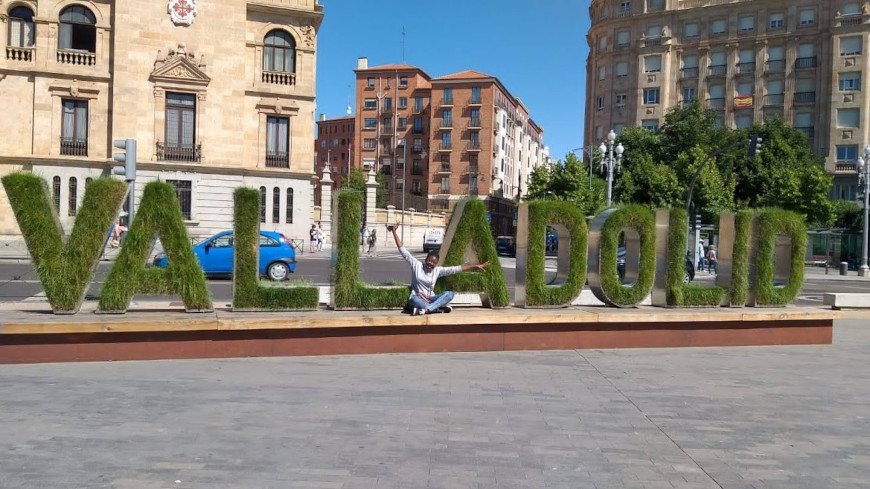Menu
- Spring Graduation Ceremonies 2025
- SRC Online Elections 2025
- Application & Registration Information
- Academic Calendar 2025
- Fees Booklet
- Academic Calendar 2026
- Study Opportunities
- ENVISION2030 Institutional Awards
- Career Leaflets
- Handbooks
- Court Order – Forums Threat
- ENVISION2030
- Why Choose DUT
- “Missing Middle” application form
- NSFAS New Students
- NSFAS
- Autumn Graduation Ceremonies 2025
- Honorary Doctorates
- DUTLink Newsletter
- Lecture Timetable
- Association of Commonwealth Universities
DUTLINK
Our Facebook Page
Testimonials From Students
Click to expand
My life changing experience in Valladolid by Busola Olagunju
A rare privilege that cannot be overemphasized is the opportunity to move across continents to gain and glean experience in my field of study amidst seeing life and people in another perspective.
I am privileged to be a part of the 2021 Erasmus mobility program. It is a life-changing opportunity that has broadened my horizon and expanded my research frontiers to see life and people from differently.
The journey started on the 8th of July when I left king Shaka airport for Barajas Adolfo Suárez Airport Madrid. On arriving at Madrid, having gone through the rigor of language barrier, we (myself and Sibiya, a fellow grant holder from DUT) eventually got on a train that connected us to the ones that took us to Valladolid, our final destination. The estimated time for the journey was a maximum of two hours, but we got to Valladolid eventually after about four hours because we missed our way.
 |
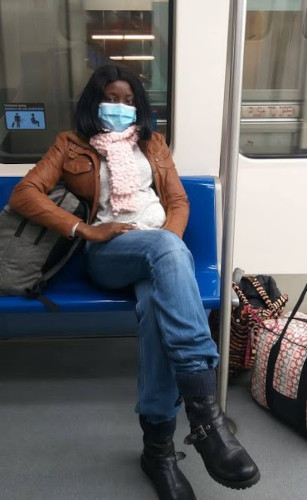 |
On the 12th of February, I was scheduled for an appointment at the international office alongside other students, where we were briefed on the pros and cons of the program alongside our stay in the city. The ambiance and serenity of the city and the people I met were mindblowing; it was nothing short of expectations.
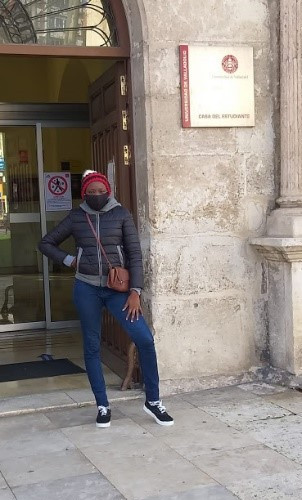 |
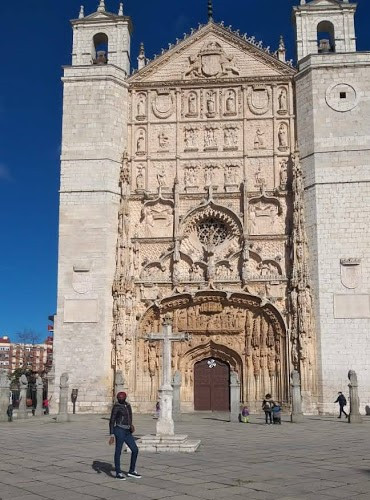 |
Lectures officially started on the 15th Of February. The school of Industrial Engineering used the first day of lecture to welcome us into the school with further details of the program, guided us on the timetable structure and how to navigate our way to the lecture rooms.
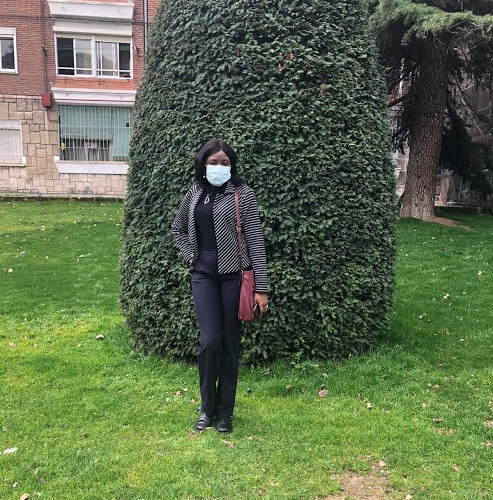 |
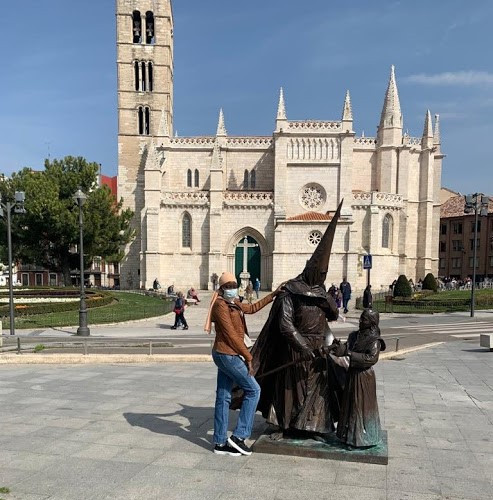 |
I had barely used an hour in the lecture room when I realized that the course of my career was set to change forever with this amazing opportunity. From the organization in the lecture notes, presentation and delivery of lectures to structures set in place to keep all covid-19 rules such as contact tracing mechanism to the lovely people around always ready to help, I could only be grateful for the life-changing experience I was about to begin.
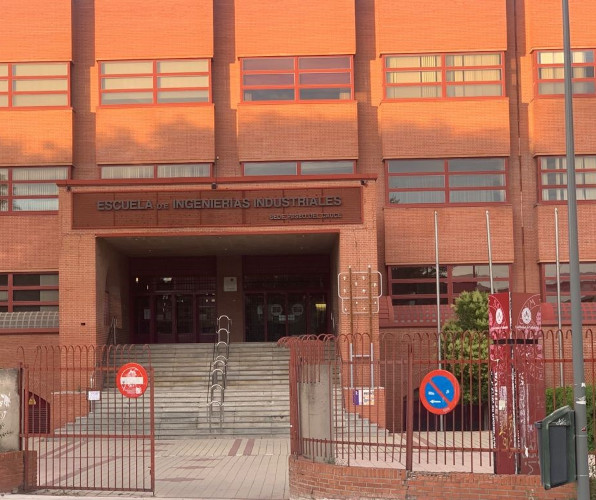 |
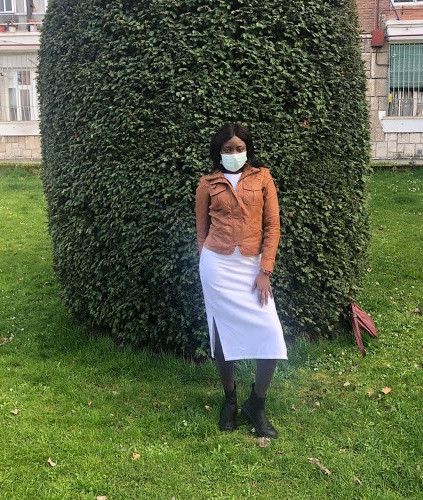 |
My gratitude would go first to my home institution: Durban University of Technology; firstly, for counting me worthy of the scholarship despite being an international student and secondly for providing all necessary supports to the best of her capacity. From the ever-listening ear of the international officer (Ms. Carol) to the provision of emergency health insurance, to catering for the transportation to and fro to Johannesburg for visa application and also the regular checkups even while in Spain.
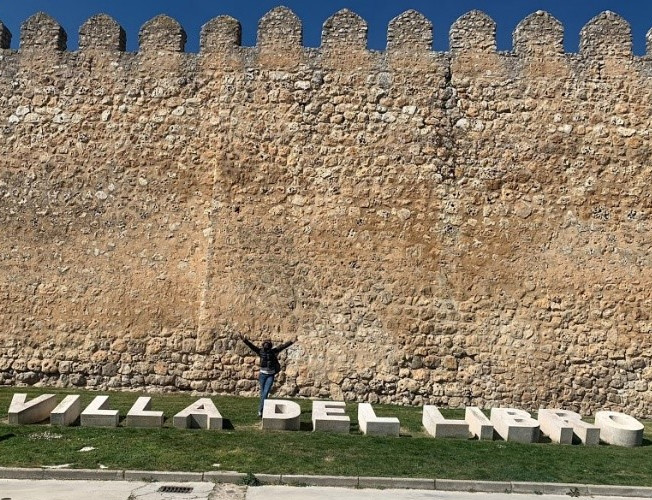 |
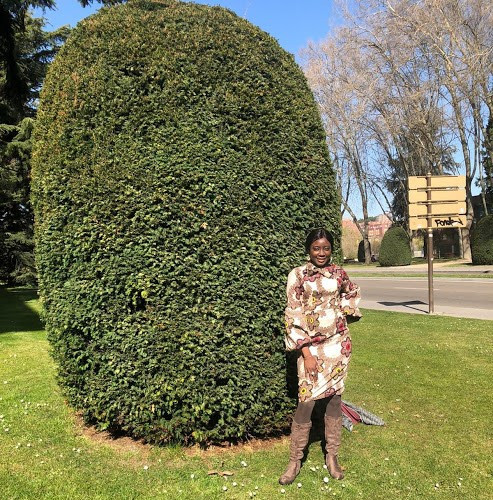 |
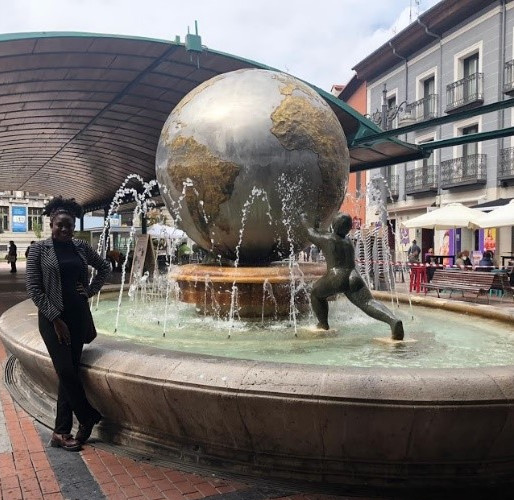 |
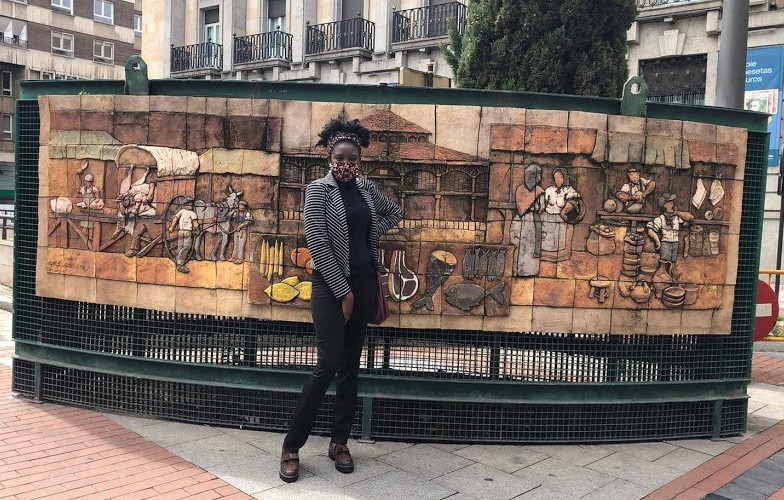 |
As time went by, I got busier with the workload from different lectures, assignments, and presentations. During one of the lectures for the module titled “simulation,” I became concerned for my continent Africa seeing she was not mentioned in all the numerous analyses and statistics presented on the level of innovations, future plans and sustainable/environmental structures in place in several nations of the earth (though essentially European countries).
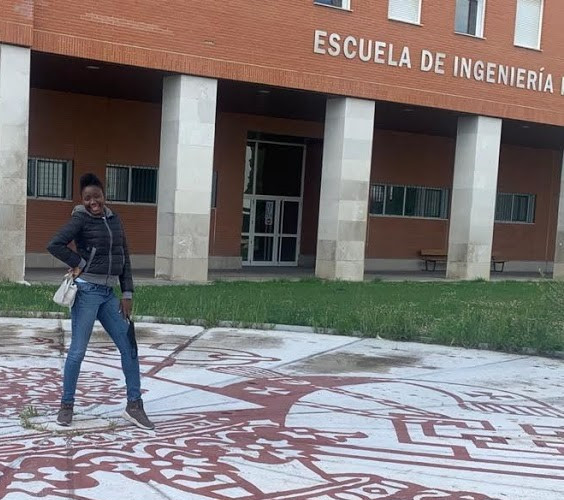 |
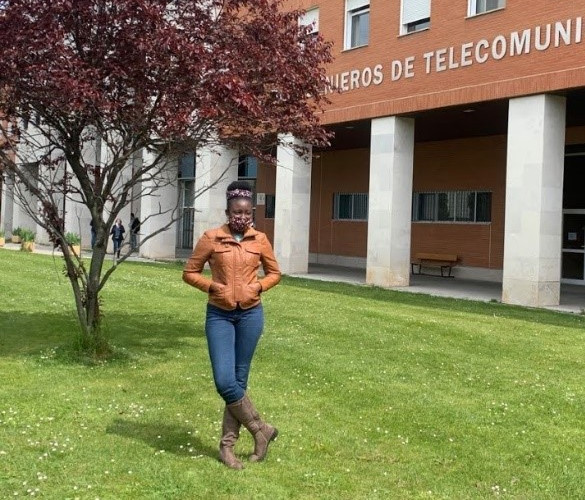 |
This often time saddens my heart as my question was always: where is Africa in all of these. Finally, Africa came up in the class twice, with the first being when a wastewater treatment method invented in UCT some years ago, and the other time was when a method was said to be more suitable for Africa due to a high number of temperate region.
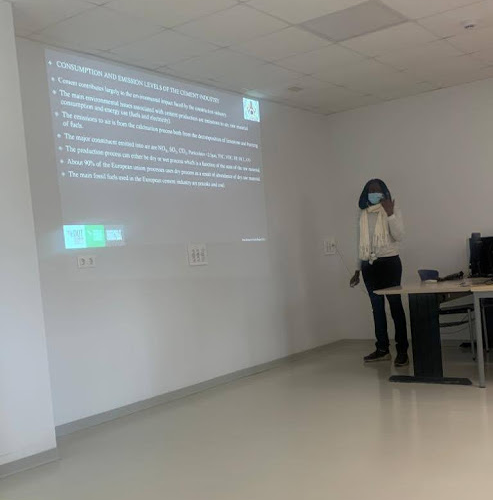 |
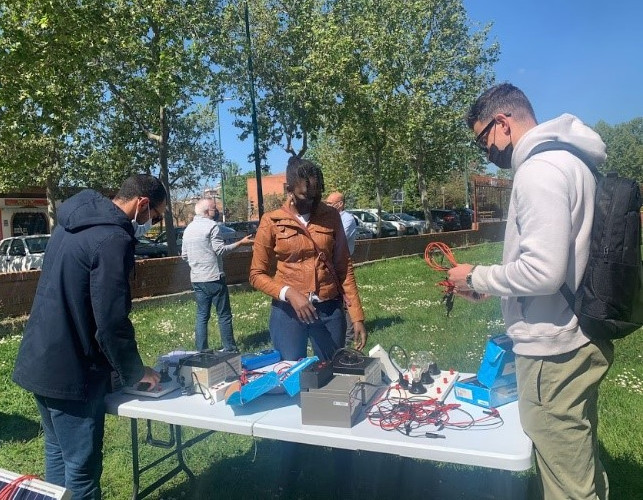 |
In my curiosity, I poured out my dissatisfaction with Africa’s absence in the statistics to my favorite lecturer, Prof. Raul, in one of our conversations. He brought clarity to my concern and reminded that one of the purposes of the mobility program is to bridge the knowledge gap by providing students from member university the opportunity to gain more experience to make life better wherever they find themselves.
He further encouraged saying you can get to whatever height you desire and even the change a perceived less developed country requires to become an advanced country. I received this comment as a challenge and purposed in my heart to be diligent, dedicated, and never be the limiting factor for my greatest feat.
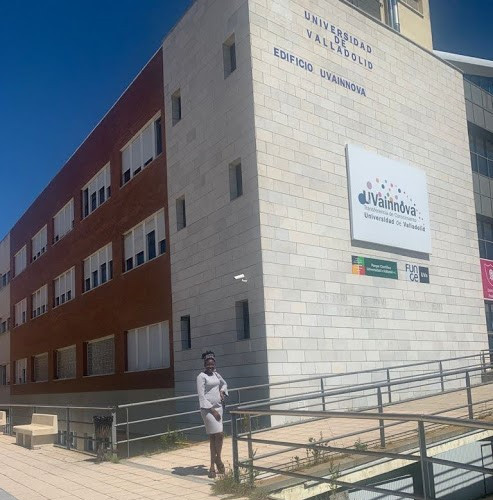 |
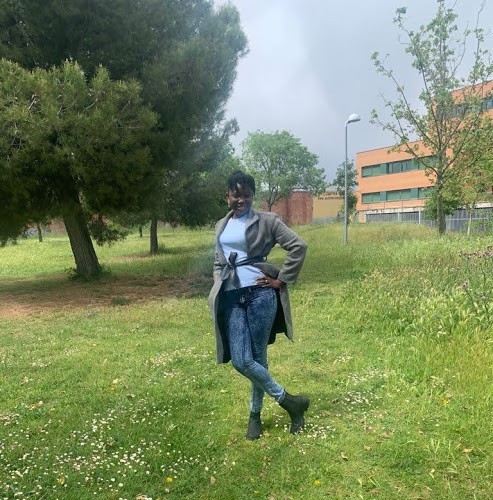 |
Having finished the Spanish exam and other pending assignments and reports by May ending, I was left to produce and defend a comprehensive master’s thesis within five weeks. It was the toughest period of the program for me because a number of documents I am to use for my work were written in Spanish. One would have thought that it shouldn’t be a problem seeing that a document can be translated using google translator. However, the reverse was the case as the translation put the entire document in disarray and merged tables with several columns into one column. This left me with no option than to translate the documents page by page. This took about four weeks to complete with the help of my husband (Dr D.C Akintayo). Amid the rigour of translation, I had to source for data, simulate analysis and also write the other part of the thesis simultaneously.
In all, I am grateful to the University of Valladolid for the conducive learning environment, though there were ups and downs, different teaching and communication style; the entire journey was a roller coaster of unlearning, learning, and relearning. I am grateful for every lecturer who contributed to my growth, widened my horizon, and helped me change perspective and see life differently.
Muchas Gracias DUT por la opotunidad!!!!
My Erasmus Experience by Nomthandazo Sibiya University of Valladolid
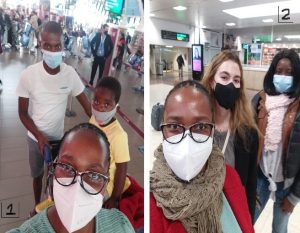 It gives me great pleasure to express my gratitude to Durban University of Technology (DUT) in general, as well as the University of Valladolid (Uva), for the 5-month scholarship. Both international offices were really helpful in ensuring the mobility preparations go well. This opportunity allowed my dream to become a reality, and I will be eternally grateful to Almighty God for making it possible. However, it was difficult to leave my daughter and fiancé behind for so long, but technology made it seem easier. I had to leave South Africa for Spain; Valladolid on February 8, 2021. My family (seen on image 1) drove me to King Shaka International Airport. It was an emotional day for me since I was leaving my family for the first time (outside of South Africa), and the idea that I wouldn’t be able to see or touch them upset me. However, I knew that my daughter was in good hands, and that the sacrifices would eventually pay off. It took me 18 hours from King Shaka International Airport to Madrid (Adolfo Suarez Barajas), including a stopover in Doha (Hamad International). I’m short of when it comes to describing my journey from South Africa to Spain. It was a once-in-a-lifetime experience with network connections. My colleague (Busola Olagunju) and I rode the train from Madrid airport to San Martin Station, as advised by my landlord. Due to the language barrier, communication was difficult, and a kind Samaritan named Racheal (seen in image 2) was able to assist us in booking tickets to Valladolid. We were on the train for another 1 hour 30 minutes till we get at our destination. I arrived at my apartment at 4 p.m. I was pleasantly welcomed, immediately felt at ease and I slept off fatigue.
It gives me great pleasure to express my gratitude to Durban University of Technology (DUT) in general, as well as the University of Valladolid (Uva), for the 5-month scholarship. Both international offices were really helpful in ensuring the mobility preparations go well. This opportunity allowed my dream to become a reality, and I will be eternally grateful to Almighty God for making it possible. However, it was difficult to leave my daughter and fiancé behind for so long, but technology made it seem easier. I had to leave South Africa for Spain; Valladolid on February 8, 2021. My family (seen on image 1) drove me to King Shaka International Airport. It was an emotional day for me since I was leaving my family for the first time (outside of South Africa), and the idea that I wouldn’t be able to see or touch them upset me. However, I knew that my daughter was in good hands, and that the sacrifices would eventually pay off. It took me 18 hours from King Shaka International Airport to Madrid (Adolfo Suarez Barajas), including a stopover in Doha (Hamad International). I’m short of when it comes to describing my journey from South Africa to Spain. It was a once-in-a-lifetime experience with network connections. My colleague (Busola Olagunju) and I rode the train from Madrid airport to San Martin Station, as advised by my landlord. Due to the language barrier, communication was difficult, and a kind Samaritan named Racheal (seen in image 2) was able to assist us in booking tickets to Valladolid. We were on the train for another 1 hour 30 minutes till we get at our destination. I arrived at my apartment at 4 p.m. I was pleasantly welcomed, immediately felt at ease and I slept off fatigue.
Personally, I’d like to thank Ms. Carol Newman for her concerns throughout and for putting us in touch with some of the personnel at the Uva International Office upon our arrival in Spain. The next day (10 February), my colleague and I sought for directions to the International Office so that we wouldn’t miss our first scheduled appointments (11 February; seen image 3).
The Uva staff were really kind and made certainly that we had all of the necessary paperwork for our stay. The first week was difficult since I didn’t have access to the internet when I wasn’t at home. Despite the language issue, I saw that Spanish people are humane, sympathetic, and eager to assist where possible. Fortunately, I was assigned a Spanish mentor called Adrián, who accompanied me in opening a bank account and obtaining a Vodafone sim card. He also took me on a tour around Valladolid; Casa Pedro (seen in imagine 4). Weeks passed, and the semester began. My colleague and I met two more ladies, one from Zambia (Erasmus student) and the other from Ecuador who has been in Spain for 2 years (seen image 5). We were also exposed to church; we were appreciated and a great deal of affection was given to us. From strangers across the world (Nigeria, South Africa, Zambia, Colombia, Ecuador, Rumania and Corea del Sur) to sisters. We visited several sites together (image 6&7), including Santander, San Sebastian, Villa del Libro, Madrid Warner Park, parkers like (Puente Duero, Campo Grande, Parque de las Norias), cathedrals and museum like (Museo Nacional de Escultura, Museo Zorrilla). We participated in many youth activities, we would meet once a week (Zoom), had random lunch/tea dates, and they made our stay unforgettable with so many pictures that cannot be included in this report.
Coming to a new environment has been difficult, but I would want to thank the international semester team (coordinator and lecturers) for making adaptability possible. They paid attention to each pupil and ensuring that everyone is on their game. This experience taught me that I needed to get out of my comfort zone and recall why I had traveled so far. My daughter, to whom I should be a role model to her, always pushes me to do better than yesterday. What also kept me going was my fiancé, who continually reminded me that “we do not fail nor give up, but we always do the impossible.” Most courses, I was the only African (as seen in image 9), which made me realize that “umuntu, umuntu ngabantu”. What I saw was student togetherness, despite the fact that we all came from various backgrounds and races. As a result, I had to establish acquaintances in order to complete the courses with good grades, which I accomplished and to have fun in Valladolid (seen in image 8 & 10. I’d like to express my heartfelt appreciation to a system dynamic lecturer named Margarita, who was always willing to help me out and made me understand the course.
Erasmus has given me a chance that I will cherish for the rest of my life. Not in my wildest dreams did I think I’d leave South Africa to see the beauty of another nation for free. What I’ve learned in the last five months is that certain journeys necessitate isolation from people you know in order to discover the ideal circle in your life. Furthermore, if you are prepared to make sacrifices, patience, devotion, and persistence can open up many opportunities for you. I experienced a once-in-a-lifetime encounter and the sensation of knowing another language (Spanish; A1). What a wonderful, clean, safe place Valladolid was, not to mention the weather and sunset time. I wouldn’t mind returning with my family for good. Spain, in my opinion, is the place to be for growth, new challenges, and exploration.
My Erasmus Experience at the University of Huelva by Palesa Kikine
Arrival:
I flew from Madrid to Seville, then took a bus to Huelva. From the Seville airport there was a 4 euro bus (A49) that goes through the city, the last stop was the Plaza de Armas bus terminal – where I took a 1-hour Damas bus to the Damas S.A. bus terminal in Huelva
The hostel given on the acceptance letter by the university was excellent. It was very well equipped and centrally located. It was 6 euros with a cab from the bus terminal. I arrived in Huelva two weeks before orientation began and met with Mr Juan José on the third day of my arrival. He had me sign the arrival form and gave me a welcome pack which included: a map of the campus, registration timetable, an appointment card for registration, a timetable for the orientation activities organised by the Erasmus Student Network (ESN) and a gift card to Holea Mall (the only mall in the city, across the road behind the main campus). The pack also included a “student card” which was an A4 document with my names, date of arrival and date of the end of the semester.
With these documents and my passport I could immediately open a bank account with the bank Banco Santander located within the campus. 40 euros had to be deposited into the bank account to open it. It took a week to get the debit card and set up the banking app, the official bank document had to be sent to the international office. 85 % of the Erasmus scholarship was deposited at the end of October 2019, the remaining 15 % was deposited towards the end of the semester in early February 2020.
I met with my supervisor, Dr Moisés, that same week to plan my capstone project for the semester.
After this initial meeting we met every Friday morning till the end of the project.
 |
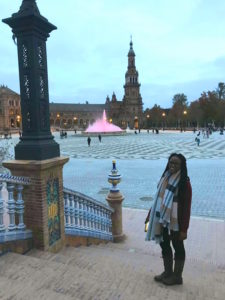 |
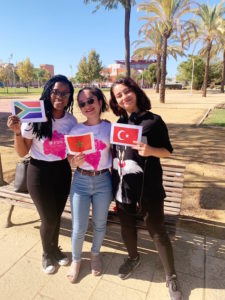 |
 |
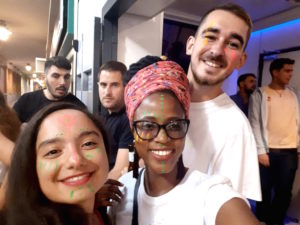 |
 |
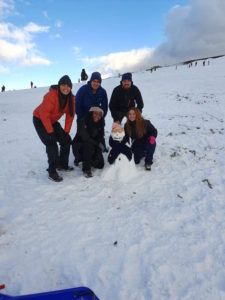 |
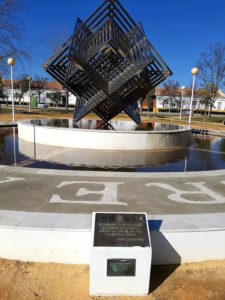 |
Welcome Weeks and Registration:
The Welcome Weeks/Orientation were during the last two weeks of September as teaching began on the 1st of October. It began with the official welcome ceremony where we were addressed by the Dean and officers of the International office and the management of the ESN. The first week, the lecturers did presentations for each of their courses to ensure students knew what the subjects entailed before registering. It was possible here to change/adjust the courses chosen in the Learning Agreement if there was clash in lecture times or if another subject seemed more interesting. There were registration tutorial sessions hosted by Mr Juan José where he went through each step of the online registration i.e. how to choose subjects and create our own course timetable successfully (as long as the courses added up to 30 or more credits and didn’t overlap/clash)
Registration occurred in the second week. Each international student had a set appointment, we had to bring all our documents i.e. final Learning Agreement signed by the sending University, online Spanish registration etc.
Accommodation:
The official university residences were for Spanish students, Erasmus/international students had to find their own apartments to live in for the semester. I found my apartment through a housing agency called Housing Huelva. The whole month before the teaching starts, they had afternoon group tours at 5 pm of all their available apartments around the city. I found one I liked after a week, signed a contract and moved in with two flatmates. It was also possible to find an apartment online with Housing Huelva or directly with landlords before leaving your home country.
Most apartments had uncapped internet included in the rent, bills that were excluded were water (paid once every two months together with rent), electricity (paid monthly at the Correos Post Office) and 15 euro butane gas bottles (refilled as needed, used to heat kitchen and bathroom water). Most apartments didn’t have central heating but were equipped with portable heaters or air-conditioning, and warm clothing was recommended even indoors during winter.
The autumn/winter semester was easy to acclimatise to, between September and October, temperatures ranged from 26 to 35 oC, November to early February was between 8 and 22 oC. The summer months in Huelva can go upwards of 40 oC, so I found the first semester to be much more bearable than the second summer semester would have been.
Teaching and Learning:
The work load was quite manageable with my capstone project and three courses (including A1 level Spanish). The capstone project for me was the most time consuming, as it involved learning a number of new mathematical and design software instead of only lab experimental work.
The engineering classes I had were English-based and co-ordinated especially for international students. There was an average of 10 – 15 students in each of my classes, so lecturers could interact with each student sufficiently. The classes had two options of assessment, one was to take only one exam at the end of the semester for your whole grade and the other was more continuous – with lab demonstrations, presentations, two tests, small assignments, discussions, and excursions – graded activities whose marks would be combined to make the final grade. We were encouraged to take the second option as we would get more value from the courses this way. Most class materials were made available well in advance on the Moodle platform which we could access immediately after registering.
For my Capstone project I was in the Chemical Engineering department supervised by Dr Moisés, who was by far the best supervisor I’ve had in all my undergraduate and post graduate studies at three different universities. He was attentive and supportive and patient and helped me produce a good thesis. The lecturers in general were always available outside of classes by appointment and responded well to all emails.
Organisations/Associations to Join:
The main organisation for international students was the Erasmus Student Network (ESN). They had an office in the main campus (campus El Carmen). They organised many day and night-time events, day trips to cities around the Andalusia region and the Algarve region of Portugal. Most of ESN’s events as well as food and beverages at their parties were much discounted and were a great way to not worry about overspending while having an amazing time. Another organisation that had day, weekend and five-day trips around Andalusia, in Portugal and Morocco was “We Love Spain”.
Recommendations:
Electric sockets were all two-pin plugs, therefore standard phone chargers don’t need adapters. I would recommend to either purchase an international adapter for laptop chargers etc. before leaving
South Africa, or to purchase a laptop charger with two-pins when purchasing a new phone sim-card at a computer or phone store after arriving.
I sprained my ankle quite badly in the beginning of my stay, the OnCampus travel insurance I had made getting treated at a nearby private hospital smooth. I had to call the insurance prior to going to the hospital where they arranged an appointment on my behalf, therefore, the hospital was expecting me when I arrived. I only had to show my passport and my copy of the insurance certificate. I only had to pay for crutches; the consultation, X-Ray and an injection and ankle dressing were covered; at the pharmacy I had to pay for the prescribed medication which the insurance paid me back.
Transport-wise, the city was not big. The city centre and the main campus were on opposite ends of Huelva, about 15 minutes’ walk in either direction from the middle. Depending on where you find an apartment there was a very reliable bus service too, with an app (EMTUSA) where you could track the busses live and see which route is best. The student monthly bus card was 20 euros, and 1.10 euro per ride if paying cash. Huelva was bicycle-friendly, these are a good investment, and it is best to buy them second-hand (around 50 euros) for a 5 month stay.
The biggest culture shock I had was Siestas. I thought it was an individual thing, but turns out stores, restaurants, grocery shops etc. actually close from around 1 to 5 pm and open again at 5 to about 10 pm (later for restaurants), they say this is because it gets too hot during these times in summer so everything closes so everyone can take a break until the evening when it’s cooler. The nightlife begins well after midnight, with some places opening at 2 am. Even university office hours were until 1 pm, with only some offices opening again after 5 pm. Making local Spanish friends was also great, they were friendly and open, and can gave practical advice on how to navigate around that you might not get if isolated in the international community.
Overall:
My Erasmus experience was invaluable. I think it was wise that DUT offered this programme to masters level students as it made it easier to navigate the university space, time management and managing finances between living costs, trips, going out etc., which I assume someone much younger might find a bit overwhelming on top of being alone in another country/continent. I gained valuable technical soft skills through the project, met people from all over the world and learned a new language. It was easy to communicate with the international office throughout the semester, they were very supportive and helpful. I highly recommend this programme!

